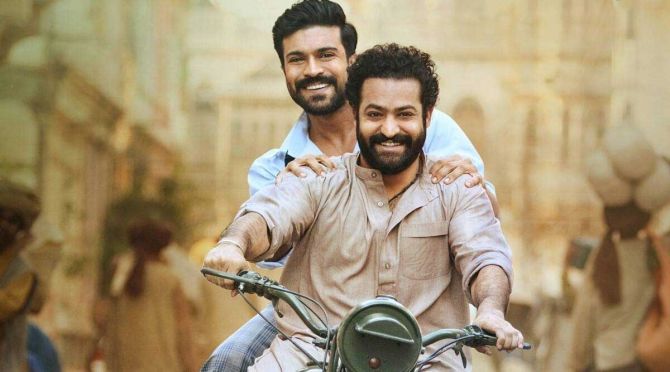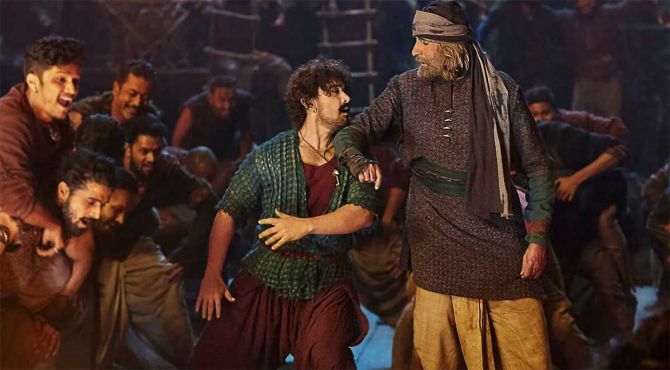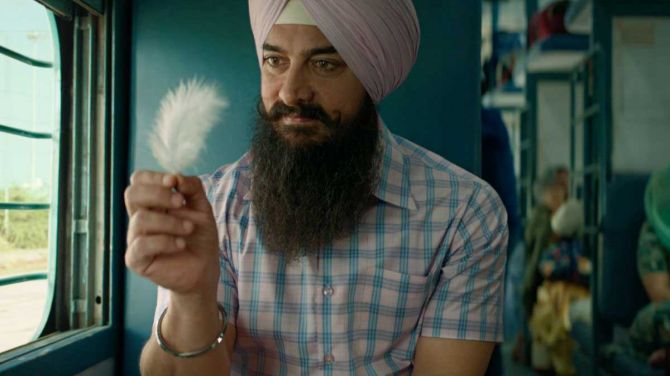'I believe it's not the success of RRR or KGF that we must actually investigate, but what makes these two films our marquee events,' argues Sreehari Nair.

A note of self-criticism: In this season of Lal Singh Chaddha, there he is bringing up Rajamouli once again. This columnist is obsessed, and he might as well come out with it.
'RRR and KGF succeeded because they were rooted, while Hindi films are failing because they are not rooted,' is such a generic piece of analysis that it had to be repeated and re-repeated across newspaper columns -- like a well-oiled commercial film formula guaranteed to catch eyeballs.
90% percent of those (to take a conservative figure) who 'enjoyed' RRR had zero to very little idea that the film was based on a meeting between Komaram Bheem and Alluri Seetharama Raju.
In fact, I believe S S Rajamouli didn't care about the aforementioned meeting beyond using it as a starting-off point for his script. And now, even SS might be compelled to think, 'Maybe, I am rooted after all.'

RRR and KGF are big successes because, sadly enough, they are our marquee events of the year. So much so that, it's fashionable for an Indian in 2022 to nudge another Indian in the ribs and ask, 'KGF Chapter 2 dekha kya?'
Think of it as a phenomenon comparable to what existed among teens and their moms when the Harry Potter series was hot in the early 2000s, or when Pac-Man was big among young boys in the 1980s (I am drawing these parallels knowing very well that J K Rowling and Namco Limited were going for more than just appealing to their audience's basest sentiments; both Rowling and Namco had some sort of artistic vision).
The rootedness of RRR and KGF is a myth, and when a film-maker like Anurag Kashyap uses something so utopic to explain the success of the two films, it gives you a hint as to why Liberal Bollywood isn't churning out as many great pictures as, say, the Malayalam Film Industry.
Kashyap's diagnosis is the perfect analogy for how a liberal Bollywood film-maker responds to social and political issues, and how someone like a Dileesh Pothan responds to them: The Bollywood film-maker might end up making a few reactionary pictures, while Pothan tries to get at the small prejudices that lie at the heart of our grand injustices.

I believe it's not the success of RRR or KGF that we must actually investigate, but what makes these two films our marquee events.
Is it a matter of quality?
No, because Thugs of Hindostan was just as 'rooted' as RRR or KGF, and for my money, was a better film.
So here's the thing.
As a country we today welcome a term like 'spectacle' when it comes from the makers of RRR or KGF, but approach with suspicion when the term is mouthed by a Bollywood film-maker, because Bollywood is seen as a rich man's fiefdom when compared to its poor cousin, the South Film Industry.
Bollywood talking about 'scale' feels like indulgence to most of us, whereas a Telugu film talking about 'scale' feels like an underdog's uprising.
What I am saying might seem like the height of scepticism until you consider these three facts: We are living in an age where our prime minister had had to use his 'humble beginnings' as his chief election plank; we are living in a time of anti-caste and anti-hierarchy sentiments running riot; we are living in an epoch where persecution complex is rife.
If you ask me, the trend of thought-and-mind-numbing films like RRR and KGF being the marquee events of our country should alarm us -- even make us worry about the health of our democracy.
But all it seems to do is push us into analysis mode.
So journalists will bring up the trend during celebrity interviews to fill the gap created by #metoo not being in vogue right now, Karan Johar will pause discussing 'making out on a seesaw' to discuss the re-birth of Masala, even as serious analysts will attribute these films' success to rootedness, to local flavour, to the absence of pretence in them (which is just another way of saying that these films are 'happily mediocre'.)

The collective will and taste of the people in a democracy does improve with time: This is my firm belief.
It has to improve, or we run the risk of going straight to fascism.
So I want to believe that there's not even a remote chance of us discussing RRR and KGF in 2032.
But suppose we are still discussing either RRR or KGF in 2032 -- it's then that the real analyses ought to begin.












 © 2025
© 2025